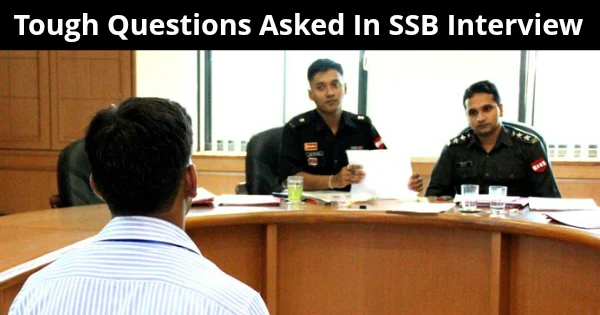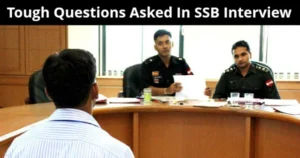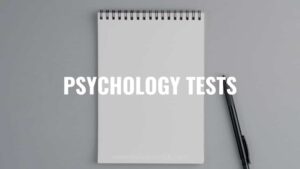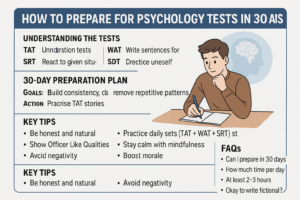The SSB Interview is a crucial stage in the selection process for the Indian Armed Forces. Conducted by senior officers, it evaluates a candidate’s personality, presence of mind, leadership traits, and emotional maturity. While many questions may seem easy, candidates often struggle when faced with tough or unexpected questions.
In this article, we explore how to handle tough questions in the SSB Interview confidently, including strategies, real examples, mistakes to avoid, and frequently asked questions.
WHY DO SSB INTERVIEWERS ASK TOUGH QUESTIONS?
Tough questions aren’t meant to trap you—they are designed to assess your:
Mental resilience
Truthfulness
Ability to handle pressure
Clarity of thought
Emotional intelligence
Remember, SSB is not about perfection but about how you think, react, and express yourself under pressure.
EXAMPLES OF TOUGH QUESTIONS IN SSB INTERVIEW
Why were you not selected in your previous SSB attempts?
Why do you have low marks in 12th or graduation?
Why do you want to join the Army despite having a good job?
Do you have a girlfriend/boyfriend? What do you do together?
What if you are not selected this time as well?
Which entry is your backup—civil services, corporate, or private?
Whom do you love more: your mother or father?
Have you ever cheated or lied to someone?
You are weak in physical fitness. Why should we select you?
You have no significant achievements. How are you a good fit for the Armed Forces?
HOW TO HANDLE TOUGH QUESTIONS IN SSB INTERVIEW
1. Stay Calm and Composed
Why It Matters: Tough questions are often asked to see how you manage stress.
Tip: Take a brief pause, breathe, and respond with a clear mind.
2. Be Honest but Tactful
Why It Matters: Assessors value honesty, but your answer must reflect maturity.
Tip: Acknowledge weaknesses, but also explain what you’ve done to improve them.
Example:
“Yes sir, I had low marks in 12th because I was distracted. But I realized my mistake and improved my academics in college.”
3. Don’t Get Defensive
Why It Matters: A defensive response shows insecurity.
Tip: Accept criticism and explain your actions with logic and humility.
Example:
“You’re right sir, I’ve had two failures. But I consider each as a lesson that helped me improve my personality and clarity of purpose.”
4. Maintain a Positive Tone
Why It Matters: Your mindset reflects your leadership potential.
Tip: Frame answers with a constructive outlook, even if the topic is negative.
5. Use Real-Life Examples
Why It Matters: They add authenticity and make your answer relatable.
Tip: Prepare personal stories that show how you handled setbacks, made decisions, or learned life lessons.
6. Understand the Purpose Behind the Question
Why It Matters: Many tough questions are not about the answer, but the way you answer.
Tip: Read the intent—Are they testing honesty, decision-making, or stress handling?
7. If You Don’t Know, Admit It Gracefully
Why It Matters: Bluffing can lead to deeper probing and exposure.
Tip: Say, “I am not sure about it, sir, but I would love to learn more.”
8. Practice Through Mock Interviews
Why It Matters: Simulated pressure helps you perform better during the real interview.
Tip: Ask mentors or friends to grill you with unpredictable questions.
SAMPLE ANSWERS TO DIFFICULT SSB QUESTIONS
Q: You have failed 3 times. Why should we select you now?
Sample Answer:
“Sir, I believe failures have shaped me into a stronger and more self-aware person. With each attempt, I’ve worked on my weak areas—especially time management and self-confidence. I now understand the process deeply and feel prepared to serve with integrity.”
Q: Why do you want to join the Army and not a corporate job?
Sample Answer:
“I’ve explored both paths, but I feel more drawn to a life of discipline, adventure, and national service. My inclination toward leadership and physical challenges aligns better with a military career than a desk job.”
Q: Whom do you love more—your father or mother?
Sample Answer:
“I respect both equally for different reasons. My father taught me responsibility, while my mother instilled compassion and balance in me.”
COMMON MISTAKES TO AVOID WHILE ANSWERING TOUGH QUESTIONS
Getting aggressive or emotional
Giving rehearsed or robotic answers
Bluffing when unsure
Blaming others for your shortcomings
Using casual or vague language
FREQUENTLY ASKED QUESTIONS (FAQs)
Q1. What if I don’t know the answer to a personal or factual question?
Answer: Be honest and polite. It’s okay not to know everything. Say, “I’m not sure, but I will look it up.”
Q2. Is it okay to admit past failures or weaknesses?
Answer: Yes, if you also talk about how you’ve learned and grown from them.
Q3. Will a candid response hurt my selection chances?
Answer: Not if it shows maturity, awareness, and a positive mindset. Candidness is appreciated when backed by responsibility.
Q4. Are these questions designed to fail me?
Answer: No. They’re designed to see how you think, behave, and handle situations—not to trap you.
Q5. How should I prepare for tough questions in advance?
Answer: Reflect on your personal journey. List your strengths, weaknesses, failures, goals, and life decisions. Practice expressing them with confidence.
CONCLUSION
Tough questions in the SSB Interview are a golden opportunity to showcase your mental resilience, clarity, maturity, and Officer Like Qualities (OLQs). The best way to handle them is through honest self-reflection, calm communication, and confident delivery. Remember, the SSB is not looking for perfect answers—they’re looking for a genuine leader who learns, adapts, and stays composed under pressure.










